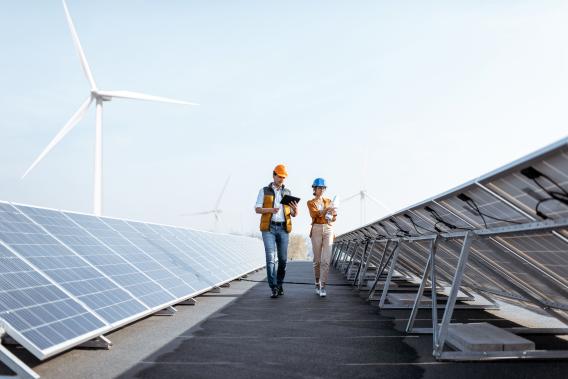Establishing decarbonisation as a performance lever for industry in 2023

According to the International Energy Agency, industry accounts for approximately 20% of CO2 emissions worldwide.
Given the climate emergency that we are facing and the current energy crisis, decarbonising industry is therefore crucially important. How can we support an economic fabric that has already been put to the test by the pandemic during the transition? How can we ensure that we experience this transition as something positive? And how can we turn the constraints it brings with it into growth opportunities? Equans implements actionable solutions to secure its industrial clients and help them reduce their carbon footprint and cut their energy bill, while remaining competitive.
The industrial sector is coming under pressure across-the-board, and this is encouraging it to speed up its energy transition. The most burning issues include supply bottlenecks, inflation and the steep increase in energy prices as a result of the war in Ukraine.
Rationalising production capacity has become vital for the whole industrial value chain
says Elvia Marcellan, Director of Client Decarbonisation at Equans France, whose vision is shared in this full record. Managing consumption and energy expenditure has become strategically important across a whole sector undergoing root-and-branch change. Before that, the pandemic had already highlighted the fragility of our supply chains. It catalysed the emergence of a new approach designed to provide greater resilience, relocate industry and bring about greater autonomy.
Before that, the pandemic had already highlighted the fragility of our supply chains. It catalysed the emergence of a new approach designed to provide greater resilience, relocate industry and bring about greater autonomy.

“ More and more companies are trying to decarbonise their practices, and doing so is in line with a global social and environmental responsibility policy ”
“Decarbonising has become a fully-fledged competitive advantage”
Some companies are setting themselves targets for cutting their emissions so as to bring themselves in line with regulatory requirements and gain entitlement to the associated subsidies. This is the case in the European Union, in the UK and in Canada in particular in relation to voluntary policies. Other companies – including ones operating in the agrifoods, cosmetics and pharmaceutical sectors – are embarking on this path because there is a great deal of demand on the part of consumers for more virtuous production models. In the luxury goods or microelectronics sectors – sectors of excellence – companies are reducing their carbon footprint because they know that doing so will improve their brand image.
However, tier 1 supplier certification is now also vital for being listed by certain clients. “For suppliers, not adopting this initiative is a barrier to entry, since the whole value chain across the sector is now embarking on this transition”, says Elvia Marcellan. “Decarbonising has become a fully-fledged competitive advantage”.
Reconciling carbon and economic performance
The whole industrial sector is taking action. Companies are looking for advice and operational solutions that they can implement quickly are required to help them achieve energy efficiency, ensure continuity of service… and pay their bills! But, although the technologies are now mature enough for this transition to get underway, companies are struggling to get to grips with them and make a start. They have to deal with multinational regulations and complex local administrative requirements, and there are investments involved… they cannot make progress on their own.
At Equans, the energy transition is rooted in our very reason for existing, and implementing it is in our DNA. Partnering our clients means first and foremost exercising our duty to advise them and raise their awareness. Providing them with security. And helping them achieve their aims to consume less and be greener out in the field. Our aim is to successfully combine energy efficiency, decarbonisation and economic profitability.
Elvia Marcellan
5 levers for decarbonising industry
At Equans, our mission is to help our clients with their energy transition.
To do this, we develop concrete, tailor-made solutions for them which are designed to meet their current decarbonisation and performance aims, irrespective of the area in which they operate. Our aim: reduce our clients' greenhouse gas emissions, while at the same time ensuring a high level of profitability.
We distinguish between five levers for industrial decarbonisation that Equans uses together to achieve net zero:
- On-site production of renewable energy,
- Recovering waste energy,
- Energy efficiency,
- Green fluids and mobility,
- Carbon offsetting
Financing and expertise: ensure you have the resources you need
Financing solutions, Energy Savings Certificates (ESC), recovery plans and clean investment: Equans has concrete solutions for each lever for action – from choosing which projects to deploy to the regulations to follow and the subsidies to obtain in each country. It is able to do this thanks to its international presence and its powerful regional coverage.
Equans' experts help manufacturing companies achieve operational control over the whole value chain: putting together administrative and financial documents, feasibility studies, implementing the chosen solution, maintenance, carbon accounting for long-term monitoring. This way, decarbonisation can get off the drawing board and become a reality – provided the right skills are in place for it to be implemented!
To train, recruit and support talented, qualified people in these professions that are key for the future, Equans has put in place programmes and partnerships at local level, designed to help people acquire the right skills. At the same time, it is implementing a dynamic learning policy targeting future generations. At the same time, with technologies that are continually evolving to meet emerging needs, Equans has created the Decarbonisation Business Club, run by Elvia Marcellan:
Our community of international developer experts uses it to engage in continual discussions about good practices, tools, references and expertise so that these innovations can be adopted and offered: a unique collaborative approach which provides our clients with global vision and solutions. Hydrogen, for example, is the focus of many discussions.
Industry and decarbonisation: a few key figures
Industry is the third biggest CO2 emitter in the world (19%), just behind the electricity generation sector (41%) and transport (24%). Heating accounts for nearly half of all energy consumption worldwide. And industrial processes account for 51% of the total used for heating. Equans’ solutions have helped reduce the energy bills of certain industrial sites by 20 to 30%.
Agreement on market reforms and border carbon tax: the EU signs two major commitments at the end of 2022
On 13 December, the European Union (EU) adopted a carbon border adjustment mechanism (CBAM): a world first. Under the scheme, imports will be taxed in the most polluting sectors (steel, cement, fertiliser, etc.) from third-party countries which have less strict norms when it comes to tackling greenhouse gas emissions, according to Le Monde.
Aim: a net zero EU by 2050
Barely 5 days later on 18 December, European legislators adopted the implementation of this carbon tax – the only one of its kind in the world: its purpose is to cut carbon emissions by 55% across the EU between now and 2030, and to ensure that European companies remain competitive by putting an end to their free entitlement to pollute the environment. This commitment bolsters the “polluter pays” principle, the aim being to avoid ecological dumping or carbon leakage (transferring production outside of Europe), while at the same time encouraging everybody else to raise their climate targets. The tax will apply to buildings, as well as road and maritime transport. It will impact households, but will be managed so as to minimise its impact: it will be capped at €45 per tonne of CO2 emitted starting in 2027, and guaranteed until 2030. Should energy prices rise further, the application of this tax could be delayed a year until 2028.



